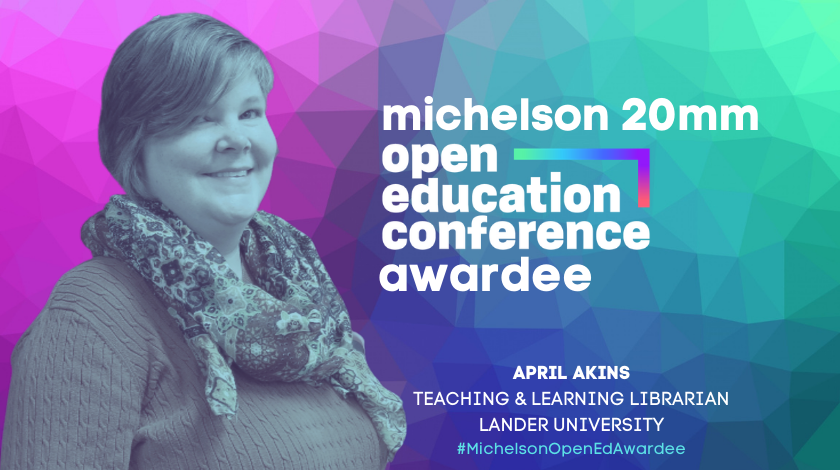Over the next few weeks we will be sharing reflections from our #OpenEd scholarship recipients on their experiences at this year’s Open Education Conference. Today, we are featuring April Akins, a Teaching and Learning Librarian at Lander University.
In my position at Lander University, I teach “one-shot” information literacy sessions and coordinate our information literacy program. I am also the coordinator for our affordable learning initiative, Co-Editor of the South Carolina Libraries journal, and Chair of the Partnership Among South Carolina Academic Libraries’ (PASCAL) Affordable Learning Committee.
2020 has been a year unlike any other. The pandemic and systemic social injustices have taken lives and left our world, society, and educational institutions with gaps that will be challenging to fill. The extraordinary moment we’re in has made me all the more honored to have participated in this year’s OpenEd20 Conference as a first-time attendee. The weeklong, virtual conference was jam packed with amazing keynotes, talks, roundtables, and social events. I wished I could have attended them all!
As I excitedly registered for events, I found that I was gravitating toward themes around the ideas of equity and inclusion. Looking back, there were over twenty sessions on social justice, which goes to show just how socially aware the open movement has become. My reflection on the OpenEd conference focuses on these elements that have charged my passion for creating a more equitable world through open education.
My biggest takeaway from the conference is that everything I do needs to come from a place of caring. The keynote session, “Equitable Emergence: Telling the Story of ‘Equity Unbound’ in the Open,” sparked this thought process by illustrating the equity versus equality images that we often see with three individuals trying to reach for an object–in this case, an apple–and how one could make this scenario equitable or equal. The discussion went further to say that not everyone wants an apple, some might want an orange, and others may need care rather than fruit. I think we are often quick to assume that to be inclusive we need to make everything the same and that is not necessarily the right answer.
Open education has started the revolution of making educational materials, textbooks, and courses inclusive within the framework of caring. This can be seen in the way a course is created, designed, and presented. Several OpenEd20 sessions inspired me to dive deeper into how I can use open pedagogy in my information literacy course to let my students’ voices, perspectives, and ideas become a part of the conversation. As a result, classmates would begin to learn from one another.
Discussions on course creation that centered around inclusion and caring looked at ways to broaden courses for diverse audiences. This perspective can meaningfully impact students as they begin to see themselves in their course materials. Sessions like these and others provided me with the resources I need to reimagine my course and help faculty find relevant and key materials for their classes as well.
During Marco Seiferle-Valencia’s session, “Looking Beyond Cost: Open Educational Resources (OER) as Intentionally Engaged Social Justice,” I truly saw how open education connects to social justice. I recommend keeping an eye out for his forthcoming article to learn more about his approach. He leaned on Sarah Lambert’s Three Social Justice Principles for OER and brought the session into focus on how inclusion and caring are essential to achieving the goals of the open education movement.
The Michelson 20MM Foundation is dedicated to supporting and investing in leading organizations, technologies, and initiatives that seek to transform learning and improve access to educational opportunities that lead to a meaningful career. Michelson 20MM was founded thanks to the generous support of renowned spinal surgeon and inventor Dr. Gary K. Michelson and his wife, Alya Michelson. Visit us at 20mm.org.
